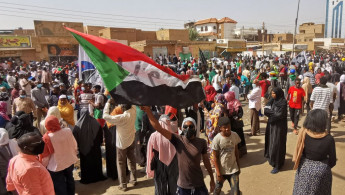Sudanese forces arrest Alaraby TV journalists over coverage of protests
Sudanese security forces stormed the office of Alaraby Television in Khartoum on Thursday and arrested several journalists, the New Arab's sister channel Alaraby TV said today.
Reporter Wael Mohammed Alhassan, office supervisor Islam Saleh, camera operator Mazen Oono and his assistant Abu Baker Ali were all arrested during the raid.
They had been covering pro-democracy demonstrations taking place on Thursday and over the past months in Sudan, demanding a return to civilian rule.
"Alaraby Television strongly condemns these actions, calls for the immediate release of Alaraby’s team in Khartoum, and holds Sudanese authorities fully responsible for their safety and well-being," the channel said in a statement, adding that its team operated with all required licences and permits.
"The actions of the Sudanese Security Forces are a serious attack on the rights of journalists to work freely and without intimidation. The network calls upon all international human rights organisations to condemn the targeting of journalists and journalism," the channel added.
Demonstrations have rocked Sudan since an October 25 military coup during which Sudan's top general, Abdel Fattah al-Burhan, seized power and detained Prime Minister Abdalla Hamdok.
Under international pressure, Hamdok was eventually reinstated as part of a deal signed on November 21. But pro-democracy activists have vowed to maintain pressure on the military authorities and protests have continued since, with dozens of people killed.
Alaraby Television is a regional TV channel covering the Arab World and broadcasting from London.
Set up in 2015, it has played a key role in combating disinformation spread by state broadcasters in a region dominated by authoritarian government narratives.
Over the past years, its broadcasts have been blocked by the rulers of Egypt, Saudi Arabia, Bahrain and the UAE.
The station is part of the Fadaat Media group, which also includes the al-Araby al-Jadeed daily newspaper and The New Arab website.





 Follow the Middle East's top stories in English at The New Arab on Google News
Follow the Middle East's top stories in English at The New Arab on Google News


